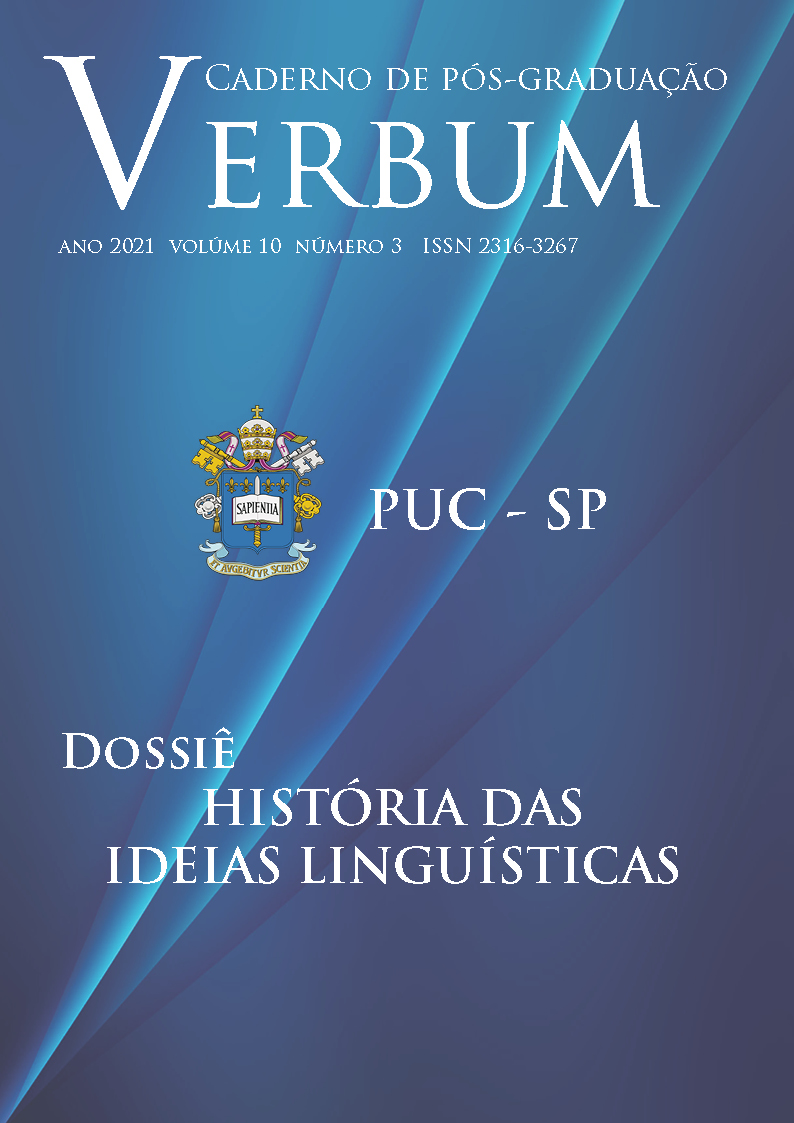STUDY OF GRAMMATICA ANALYTICA E EXPLICATIVA DE LINGUA PORTUGUESA (PARDAL E ORTIZ–1884)
DOI:
https://doi.org/10.23925/2316-3267.2021v10i3p13-24Keywords:
Gramática Analítica e Explicativa de Língua Portuguesa, General concepts, Morphology, SyntaxAbstract
The aim of this work is to analyze the Analytical and Explanatory Grammar of Portuguese Language, by Professors Pardal and Ortiz, looking at the constitution of this grammar,itsconcepts of Grammar, its division and, subsequently, in relation to the postulates of morphology and syntax, because the edition of this book work is the fifth, dating from 1884, when the assumptions of traditional grammar prevailed, and Brazil was in a monarchy, but screamed for the Republic and going in a througha reconfiguration in social spheres, economic andeducational. Some reforms began to be implemented in the School and society, made up mainly of educated people, began to leave their children in our country so that they could reach Higher Education, in the few faculties that emerged. The guiding method of this work is descriptive-analytical, following the theoretical assumptions of the History of Linguistic Ideas (AUROUX, 1989;1992; FÁVERO and MOLINA: 2004,2006,2019; \ORLANDI and GUIMARÃES, 1996, ORLANDI, 2002 and COLOMBAT, FOURNIER e PUECH, 2010)
References
ARNAULD, A.E LANCELOT, C. Gramática de Port-Royal: gramática geral e razoada.Tradução de Bruno Basseto e Henrique G. Murachco. São Paulo: Martins Fontes, 1992 [1660].
AUROUX, S. A. Revolução Tecnológica da Gramatização. Campinas: Editora da UNICAMP, 1992.
AUROUX, S. Histoire des Idées Linguistiques. Paris: Pierre Mardaga Editeur, Tomo1, 1989.
BRASIL. Ministério do Império. Relatórios apresentados à Assembléia Geral Legislativa. Rio de Janeiro: Typ Laemmert, 1850-1889.
CAVALIERE, R. Fonologia e Morfologiana Gramática Científica Brasileira.Rio de Janeiro: Editora da Universidade Federal do RJ, 2000.
CAVALIERE, R. A gramática no Brasil: ideias, percursos e parâmetros. Rio de Janeiro: Lexicon, 2014.
COLOMBAT, B.; FOURNIER, J.M.;PUECH, C. Histoire des idées sur les langues et les langages. Paris, Klincksieck, 2010.
FÁVERO, L. L. As Concepções Linguísticas no Século XVIII: a gramática Portuguesa. Campinas: Editora da Unicamp, 1996.
FÁVERO, L. L. Gramática é a Arte. In: ORLANDI, E.P. (org.). História das ideias linguísticas no Brasil–Construção do Saber Metalinguístico e Constituiçãoda Língua Nacional. 1. ed. Campinas, SP: Pontes; Cáceres, MT: Unemat Editora, 2001. p. 59-70.
FÁVERO, L. L.; MOLINA, M. A. G. História das Ideias Linguísticas: origem, método e limitações. Revista da Anpoll, n. 16, p. 131 a 146, 2004.
FÁVERO L. L. ; MOLINA, M. A. G. As concepções Linguísticas no Século XIX: A Gramática no Brasil. Rio de Janeiro: Editora Lucerna, 2006.
FÁVERO, L. L.; MOLINA, M. A. G. As concepções linguísticas no Brasil no século XIX e início do XX: Gramáticas da Infância. São Paulo: Terracota, 2019.
FÁVERO, L. L.; MOLINA, M. A. G. Conhecimento linguístico: século XIX: tradição e modernidade? Disponível em: http://www.scielo.edu.uy/scielo.php?script=sci_arttext&pid=S2079-312X2013000100009. Acesso em 07 dez. 2021.
NEBRIJA, E. A. de. Gramática Castellana. Madri, Fundación Antonio de Nebrija, 1992 [1492].
ORLANDI, E. P.; GUIMARÃES, E. Identidade Linguística, in: Língua e Cidadania.Campinas: Editora Pontes, 1996.
ORLANDI, E. P.; GUIMARÃES, E. (orgs.). Institucionalização dos Estudos da Linguagem: A disciplinarização das Ideias Linguísticas. Campinas: Pontes, 2002.
ORLANDI, E. P. Discurso e Texto: formação e circulação do sentido. Campinas, SP: Pontes, 2001.
ORLANDI, E. Língua e conhecimento linguístico: para uma história das ideias no Brasil.São Paulo, Cortez, 2002.
PARDAL, C. M. F.; ORTIZ, J. Grammática analytica e explicativa da língua portuguesa. 5. ed. Rio de Janeiro, 1884 [1871].
POLACHINI, S. B. Uma história serial e conceitual da gramática brasileira oitocentista de língua portuguesa, 2018. 457p. Tese(Doutorado em Letras) – Programa de Semiótica e Linguística Geral, Universidade de São Paulo, São Paulo, 2018.


